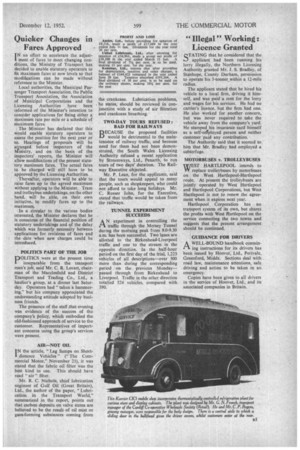Quicker Changes in Fares Approved
Page 37

If you've noticed an error in this article please click here to report it so we can fix it.
IN an effort to accelerate the adjust
ment of fares to meet changing conditions, the Ministry of Transport has decided to enable statutory operators to fix maximum fares at new levels so that modifications can be made without reference to the Minister.
Local authorities, the Municipal Passenger Transport Association, the Public Transport Association, the Association of Municipal Corporations and the Licensing Authorities have been informed of the Minister's intention to consider applications for fixing either a maximum rate per mile or a schedule of maximum fares.
The Minister has declared that this would enable statutory operators to assess the position for the next year or so. Hearings of proposals will be arranged before inspectors of the fvfinistry, and on the basis of the inspectors' reports, the Minister will allow modifications of the present statutory maximum fares. The actual fares to be charged will still have to be approved by the Licensing Authorities.
Thereafter, operators will be able to raise fares up to the agreed maximum without applying to the Minister. Tram and trolleybus undertakings, on the other hand, will he able, on their own initiative, to modify fares up to the maximum.
In a circular to the various bodies interested, the Minister declares that he is conscious of the financial position of statutory undertakings and of the delay which was formerly necessary between applications for revisions of fares and the date when new charges could be introduced.
POLITICS PART OF THE JOB 10:110LITI CS were at the present time 1 inseparable from the transport man's job, said Mr. C. R. Lova% chairman of the Macclesfield and District Transport and Trading Co., Ltd., a haulier's group, at a dinner last Saturday. Operators had " taken a hammering," but his company appreciated the understanding attitude adopted by business friends.
The presence of the staff that evening was evidence of the success of the company's policy, which embodied the old-fashioned approach of service to the customer. Representatives of important concerns using the group's services were present.
AIR—NOT OIL
IN the article, "Lag Sumps on Short
distance Vehicles" (" The Commercial Motor," November 21), it was stated that the fabric oil filter was the best kind to use. This should have read " air" filter.
Mr. R. C. Nichols, chief lubrication engineer of Gulf Oil (Great Britain), Ltd., the author of the paper, "Lubrication in the Transport World," summarized in the report, points out that carbon deposits on valve stems are believed to be the result of oil mist or gum-forming substances coming from
the crankcase. Lubrication problems, he states, should be reviewed in conjunction with a study of air filtration and crankcase breathing.
TWO-DAY TOURS REFUSED: BAD FOR RAILWAYS
BECAUSE the proposed facilities would be detrimental to the maintenance of railway traffic, and because need for them had not been demonstrated, the South Wales Licensing Authority refused a recent application by Streamways, Ltd., Penarth, to run tours of two days' duration. The Railway Executive objected.
Mr. P. Lean, for the applicants, said that the tours would appeal to many people, such as shopkeepers, who could not afford to take long holidays. Mr. C. Rosser John, for the Executive, stated that traffic would be taken from the railways.
TUNNEL EXPERIMENT SUCCEEDS
AN experiment in controlling the traffic through the Mersey Tunnel during the morning peak from 9.0-9.30 a.m. has been successful. Two lanes are allotted to the Birkenhead-Liverpool traffic and one to the stream in the opposite direction. In the half-hour period on the first day of the trial, 1,223 vehicles of all descriptions—over 300 more than during the corresponding period on the previous Monday— passed through from Birkenhead to Liverpool. Traffic in the other direction totalled 524 vehicles, compared with 390.




























































































